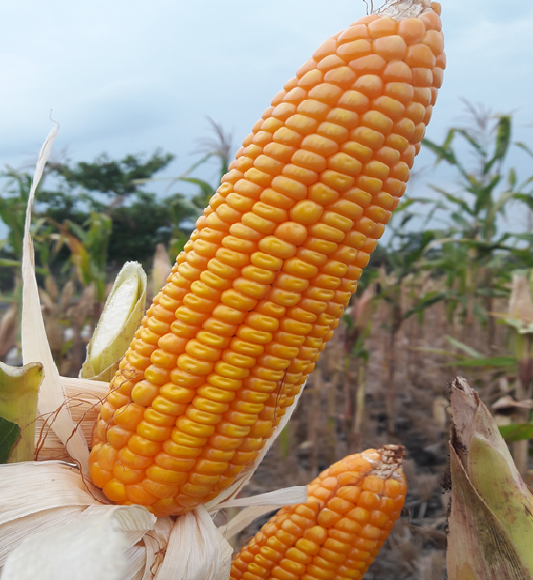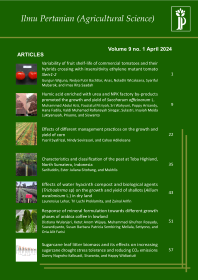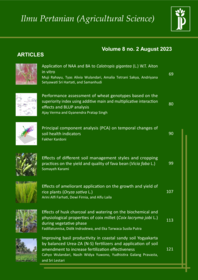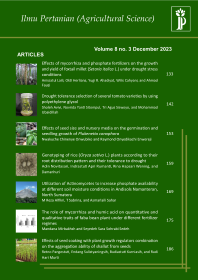
The Effects of Urea Fertilizing Techniques on Growth and Yield of Corn (Zea mays) in Vertisol Playen, Gunungkidul
Heny Alpandari(1*), Eka Tarwaca Susila Putra(2), Cahyo Wulandari(3)
(1) Faculty of Agriculture Universitas Gadjah Mada, Yogyakarta
(2) Faculty of Agriculture Universitas Gadjah Mada, Yogyakarta
(3) Faculty of Agriculture Universitas Gadjah Mada, Yogyakarta
(*) Corresponding Author
Abstract
Corn production can be increased by proper urea fertilizers. Fertilization techniques commonly used by farmers are broadcast or buried into soil. But in both of these techniques can make to lose urea faster, because nature of urea is easily changed to ammonium (NH4+), then changed to ammonia (NH3) which leads to volatilization or leaching. This study aims to compare urea fertilization techniques commonly used by farmers and their effects on the growth and yield of corn in Vertisol on rainy season. The research method used was a single factor in randomized complete block design (RCBD) with four blocks as replications. The treatments were without urea (N1), buried urea into soil (N2), and broadcast of urea (N3), with a urea dose of 348 kg/ha obtained from soil sampling analysis. The observation of parameters (1) Climatic condition, (2) physical and chemical characters of soil, (3) Plant height, (4) Effect N fertilization on root and shoot, (5) Chlorophyll content and nitrate reductase activity, (6) observations of harvested. The data were analyzed using Analysis of Variance (ANOVA) at 5% levels, and continued Duncan Multiple Range Test (DMRT) at test level of 5%. The results showed that fertilization affecteds all parameters. Buried into soil (N2) and broadcast (N3) technique was significantly different only in leaf N content that is 3,31% (N2), 2,16% (N3) and also in higher plant, but not significantly different in other variables. Based on this research, farmers still use broadcast techniques because they are more efficient in terms of time and energy.
Keywords
Full Text:
PDFReferences
Bidwell, R.G. 1979. Plant physiology. 2th ed., New York:Macmillan Publishing.
Diana, S. H. Hamim. and N. Nurmauli. 2013. The effect of dose and time of urea fertilizer applications in increasing growth and maize results (Zea mays, L.) pioneer 27. J. Agrotek Tropika., 1: 50-54.
Dwyer, L.M., A.M. Anderson., D.W. Stewart., B.L. Ma. and M. Tollenaar. 1995. Changes in corn hybrid photosynthetic response to leaf nitrogen, from pre-anthesis to grain fill. J. Agron., 87: 1221-1225.
Engelstad, O,P. 1997. Technology and use of fertilizer. 3th ed., Yogyakarta: Gadjah Mada University Press.
Fageria, N.K; V.C. Baligar, and R.B. Clark. 2005. Physiology of Crop Production. 3th ed., New York : Food Product Press.
Fahmi, A., S.N.H. Syamsudin., Utami., and B. Radjaguguk. 2010. Pengaruh Interaksi Hara Nitrogen Dan Fosfor Terhadap Pertumbuhan Tanaman Jagung (Zea Mays L) Pada Tanah Regosol Dan Latosol. J. Berita Biologi., 10: 297-304.
Hanifah, N.F., S. Amien., D. Ruswandi. 2018. Variabilitas fenotipik komponen hasil galur jagung manis padjadjaran SR generasi s3 di arjasari. J. Agrotek Indonesia., 3: 39-43.
Hartiko, H., A. Artur., S. Djodjodirjo., W. Mangoendidjo. 1991. Aktivitas enzim nitrat reduktase dan korelasinya terhadap sifat pertumbuhan tanaman kakao (Theobroma cacao L) muda. J. Ilmu Pertanian., 4: 1-13.
Lestari, G., W. Solichatun and Sugiyarto. 2008. Growth, chlorophyll content and carp plant respiration rate (Maranta arundinacea L.) after treatment of giberelic acid (GA3)’. J. Bioteknologi, 5: 1-9.
Mengel, K. and E.A. Kirby. 1987. Principles of plant nutrition. Inter. p. 687. Switzerland : Potash Ins.Bern.
Nurcahya, A.O., N. Herlina. and B. Guritno. 2017. Pengaruh macam pupuk organik dan waktu aplikasi terhadap pertumbuhan dan hasil jagung manis ( Zea mays saccharata Sturt ). J. Produksi Tanaman. 5: 1476–1482.
Prasetyo, B. H. 2007. Differentiation in properties of vertisol from various parent materials. J. ilmu-ilmu pertanian Indonesia. 9: 20–31.
Puranic, R.M. And H.S. Srivastava. 1985. Increase in nitrate reductase activity in bean leaves by light involves aregulator protein. J. Agric Biol Chem., 49: 2099-2104.
Salisbury, F.B. and C.W. Ross. 1995. Plant physiology. 2th ed., Bandung: Bandung Technologi Institute.
Sitompul, S. M. and B. Guritno. 1995. Analysis of plant growth. p. 412. In: Root. Yogyakarta. : Gadjah Mada University Press.
Tando, E. 2018. Upaya efisiensi dan peningkatan ketersediaan nitrogen dalam tanah serta serapan nitrogen pada tanaman padi sawah (Oryza sativa L.). J. Buana Sains., 18: 171 – 180.
Torey, P.C., N.S. Ai., P. Siahaan. and S.N. Mambu. 2013. Root-morphological characters aswater-deficit indicators in local rice Superwin. J. Bios Logos, 3: 57–64.
Utomo, D.H. 2016. Morfologi profil tanah vertisol di kecamatan kraton, kabupaten pasuruan. J. Pendidikan Geografi., 21: 47-57.
Yanti, S.E., E. Masrul. and H. Hannum. 2014. Pengaruh berbagai dosis dan cara aplikasi pupuk urea terhadap produksi tanaman sawi ( Brassica Juncea L. ) pada tanah inceptisol marelan. J. Online Agroekotelnologi., 2337: 770–780.
Zakaria, F. Nurdin. P. Maspeke. and Z. Ilahude. 2009. Pertumbuhan dan hasil jagung yang dipupuk N , P , dan K pada tanah vertisol isimu utara kabupaten gorontalo. J. Tanah Trop, 14: 49–56.
Article Metrics
Refbacks
- There are currently no refbacks.
Ilmu Pertanian (Agricultural Science) ISSN 0126-4214 (print), ISSN 2527-7162 (online) is published by Faculty of Agriculture Universitas Gadjah Mada collaboration with Perhimpunan Sarjana Pertanian Indonesia (PISPI) and licensed under a Creative Commons Attribution-ShareAlike 4.0 International License.













